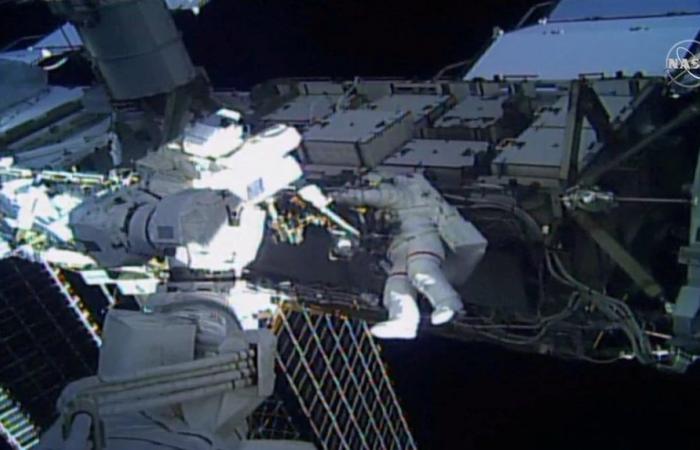
NASA ground controllers used the International Space Station’s robotic arm to free a cargo pallet containing aging batteries in March 2021. They launched about 2,600 kilograms of space junk into space. Three years later, on March 8, an object from that load crossed the ceiling and floor of Alejandro Otero’s house in Naples (Florida). Now, his lawyers have filed a claim against NASA, which they describe as historic, to receive compensation. They assure that this is the first initiative of this type and that it can set a precedent for future cases.
NASA specialists use engineering models to estimate how objects heat and break up during atmospheric reentry, but that piece made it to the Earth’s surface. It was a cylindrical object made of the metal alloy Inconel, about 10 centimeters high and 4 centimeters in diameter, weighing about 700 grams. After analysis, NASA confirmed that the object came from its flight support equipment used to mount batteries on the cargo pallet of the International Space Station and announced a detailed investigation of the launch and reentry to determine the cause of the survival of the remains and update your models if necessary. These models require detailed input parameters and are periodically updated when debris is found to have survived atmospheric re-entry.
The Oteros hired attorney Mica Nguyen Worthy of the Charlotte, North Carolina-based law firm Cranfill Sumner to manage the legal and insurance process and file a formal claim against NASA. The family claims losses for uninsured property damage, compensation for business interruption, compensation for emotional/mental distress and the costs of third-party assistance necessary in the process. The firm has not published the requested figure, which local media estimates at more than 80,000 dollars (about 75,000 euros). In addition, the insurer of the owner of the Otero home filed a simultaneous claim for material damage to which she had been subrogated.
“Space debris is a real and serious problem due to the increase in space traffic in recent years,” Worthy stressed in the statement from the law firm in which he announced his claim, which he describes as “historic” and which he assures will serve to establish the legal bases in this field. “My clients are seeking appropriate compensation to compensate for the stress and impact this event has had on their lives. They are thankful that no one was physically injured from this incident, but a ‘near miss’ situation like this could have been catastrophic. “If the debris had hit a few meters in another direction, there could have been serious injuries or a fatality,” he added in the statement.
International differences
Worthy has brought the claim under the Federal Tort Claims Act (FTCA) to fully articulate a negligence claim on behalf of its clients. NASA has six months to respond. However, the lawyer believes that US citizens should not have to file a claim under a legal theory of negligence when the Government has agreed to be “absolutely responsible” under international treaties for injuries to people. or goods on the Earth’s surface caused by its space objects.
“If the incident had occurred abroad, and someone in another country had been harmed by the same space debris as in the Oteros case, the United States would have been absolutely responsible to pay for those damages under the Convention on International Liability for Damage Caused by Space Objects also known as the ‘Space Liability Convention’. “We have asked NASA not to apply a different standard to American citizens or residents, but to deal with the Oteros and compensate them,” Worthy said in the statement.
The lawyer believes NASA has the opportunity to set a precedent by assuming its responsibility. “If NASA were to take the position that the Oteros claims should be paid in full, it would send a strong signal to both other governments and the private sector that such victims should be compensated regardless of fault,” she says.
A space dump
Low Earth orbit is a space junkyard. There are millions of pieces of space junk flying around at full speed in space. Most orbital debris is made up of man-made objects, such as pieces of spacecraft, small flecks of paint from a spacecraft, rocket parts, satellites that no longer function, or explosions from objects in orbit flying around the planet. space at high speed, according to NASA.
Most space debris moves very fast and can reach speeds of 29,000 kilometers per hour, almost seven times faster than a bullet. Due to the speed and volume of space debris, current and future space services, explorations and operations pose a risk to the safety of people and property in space and on Earth, as recognized by the US space agency itself.
There are no international space laws to clean up such debris in orbit and it is expensive to remove it. The European Space Agency (ESA) estimates that there are currently more than one million pieces of space debris larger than one centimeter in Earth orbit and 130 million larger than 1 millimeter and less than one centimeter. Each of these objects, especially the largest ones, is capable of causing catastrophic damage to space assets. ESA assures that if rapid and significant measures are not taken to improve the sustainability of space activities, the exponential growth of this debris population will pose an increasing danger to satellites and astronauts and could completely render some orbits useless.
Twelve European countries (Germany, Austria, Belgium, Cyprus, Slovakia, Estonia, Lithuania, Poland, Portugal, United Kingdom, Romania and Sweden) recently signed the Zero Waste Charter at the ESA/EU Space Council, which aims to achieve neutrality of garbage in space by 2030. It is an initiative that was announced at the ESA Space Summit meeting in Seville in November 2023.
You can follow SUBJECT in Facebook, x and instagramor sign up here to receive our weekly newsletter.





